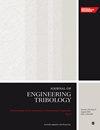Numerical simulation of the dynamic fluid–solid coupling in journal bearing with the effect of surface topography in consideration
IF 1.6
3区 工程技术
Q3 ENGINEERING, MECHANICAL
Proceedings of the Institution of Mechanical Engineers, Part J: Journal of Engineering Tribology
Pub Date : 2024-01-31
DOI:10.1177/13506501241228645
引用次数: 0
Abstract
In the case of the journal-bearing system under a mixed or boundary lubrication regime, the deformation of the bearing, the flow of the lubricating medium, and the contact of the asperities should be taken into account. The lubrication problem at the journal-shaft interface is a complicated fluid–solid coupling problem. In this study, a new approach is proposed to analyze the dynamic fluid–solid coupling problem of journal bearings. The dynamic fluid–solid coupling problem is solved by the presented non-linear hybrid conjugate gradient method, which is based on the principle of pressure balance in the lubrication zone. One transient mixed lubrication model was developed to analyze the journal-bearing performance by considering the effects of skewness and kurtosis and the mass-conserving cavitation. According to the simulated results from the journal-bearing systems under the start-up condition, it can be found that the bearing performance is sensitive to the value of skewness or kurtosis and the degree of misalignment. Within a certain range, these cases with more negative skewness or lower kurtosis are conducive to decreasing friction loss and lift-off time. The developed model can be effectively used to track the performance of journal bearings.考虑表面形貌影响的轴颈轴承动态流固耦合数值模拟
在混合润滑或边界润滑条件下的轴颈轴承系统中,应考虑轴承的变形、润滑介质的流动和表面的接触。轴颈-轴界面的润滑问题是一个复杂的流固耦合问题。本研究提出了一种分析轴颈轴承动态流固耦合问题的新方法。本文提出的非线性混合共轭梯度法是基于润滑区压力平衡原理来解决动态流固耦合问题的。通过考虑偏度和峰度以及保质空化的影响,建立了一个瞬态混合润滑模型来分析轴颈轴承的性能。根据启动条件下的轴颈轴承系统模拟结果,可以发现轴承性能对偏斜度或峰度值以及不对中程度非常敏感。在一定范围内,这些负偏度较大或峰度较小的情况有利于减少摩擦损失和起飞时间。所开发的模型可有效用于跟踪轴颈轴承的性能。
本文章由计算机程序翻译,如有差异,请以英文原文为准。
求助全文
约1分钟内获得全文
求助全文
来源期刊

CiteScore
4.20
自引率
5.00%
发文量
110
审稿时长
6.1 months
期刊介绍:
The Journal of Engineering Tribology publishes high-quality, peer-reviewed papers from academia and industry worldwide on the engineering science associated with tribology and its applications.
"I am proud to say that I have been part of the tribology research community for almost 20 years. That community has always seemed to me to be highly active, progressive, and closely knit. The conferences are well attended and are characterised by a warmth and friendliness that transcends national boundaries. I see Part J as being an important part of that community, giving us an outlet to publish and promote our scholarly activities. I very much look forward to my term of office as editor of your Journal. I hope you will continue to submit papers, help out with reviewing, and most importantly to read and talk about the work you will find there." Professor Rob Dwyer-Joyce, Sheffield University, UK
This journal is a member of the Committee on Publication Ethics (COPE).
 求助内容:
求助内容: 应助结果提醒方式:
应助结果提醒方式:


